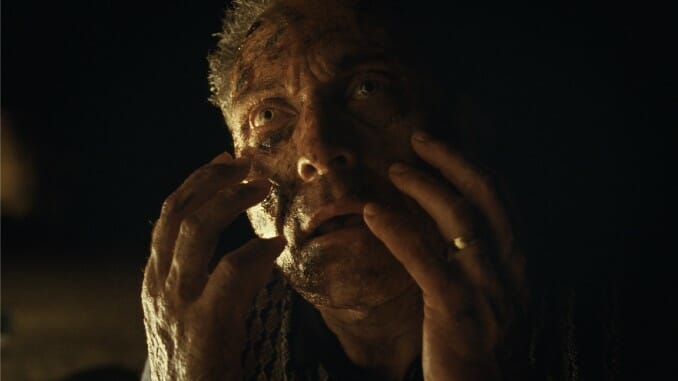In Old, and in Real Life, Time Is Against Us as Much as Each Other

In M. Night Shyamalan’s widely derided 2004 mystery-thriller The Village, the elders of a small 19th century town place the well-being of their people behind a “greater good.” They make small sacrifices to maintain an elaborate artifice that ensures the stability of future generations; not just for the quality of their livelihoods, but for the stability of the lie itself. This question of minor suffering for the sake of some bigger picture is asked again in Shyamalan’s latest venture, an empathetic sci-fi tale of a universal fear. After the director’s return from Hollywood jail following a string of critical and commercial failures, with three films that rebuilt goodwill with audiences, critics and the studio system, Shyamalan’s newest film is far more in line with his previous thematic sensibilities than what was touted in the warm reviews for his 2015 found footage horror film, The Visit. Glimmers of this could be seen in Glass, Shyamalan’s take on the superhero film and threequel to 2016’s massively successful Split and 2000’s Unbreakable. The reception to The Visit and Split proclaimed that Shyamalan was “back,” but Glass—a deeply earnest critical miss—portended the director’s true return to form with Old.
Old centers on an outwardly perfect nuclear family that is, of course, quietly fracturing. Husband Guy (Gael García Bernal), a risk assessor, and wife Prisca (Vicky Krieps), a museum curator, spit at one another over their impending separation and an as-yet-unknown medical diagnosis given to Prisca while on their vacation away at a beautiful, tropical resort with their two kids: Pre-teen Maddox (Alexa Swinton) and six-year-old Trent (Nolan River). Neither of their children know the nature of their parents’ marital dissolution or their mother’s medical condition, though the kids are clearly used to the fighting by now, but Guy and Prisca have agreed to drop the news on them following the trip. In the meantime, Trent befriends the lonely nephew (Kailen Jude) of the resort’s manager (Gustaf Hammarsten), while Maddox frets over her burgeoning adolescence—no longer an innocent child, not quite yet a teenager.
Unsurprisingly, there is something immediately off about the Anamika resort. The employees are a little too kind, a little too smiley; too accommodating and eager to make sure their guests are content to the point where the manager goes out of his way to recommend to the family the resort’s separate, secluded beach within a nature preserve nearby, simply because he “likes them.” Though initially thought to be a private excursion, the bus ride to the beach reveals that they won’t be alone. They are accompanied by vain, calcium-deficient mother Chrystal (Abby Lee), doctor husband Charles (Rufus Sewell), their young daughter Kara (Mikaya Fisher) and Charles’ mother Agnes (Kathleen Chalfant). The two families are further joined by nurse Jarin (Ken Leung) and his partner Patricia (Nikki Amuka-Bird), an epileptic.
The quiet day, isolated from the resort’s overcrowded main beach, starts off peacefully enough—children playing, selfie-taking, problem-avoiding—until everything slowly, carefully begins to unravel. The children discover lost personal items from the hotel hidden beneath the sand; Charles’ mother-in-law experiences strange pains in her chest; a rapper named Mid-Sized Sedan (Aaron Pierre)—yes, that’s right—lingers strangely at a distance as an earlier brief, cryptic scene between him and an anonymous young woman on the beach leads us to understand that something has gone seriously wrong. And that’s when the body turns up.
-

-

-

-

-

-

-

-

-

-

-

-

-

-

-

-

-

-

-

-

-

-

-

-

-

-

-

-

-

-

-

-

-

-

-

-

-

-

-

-








































